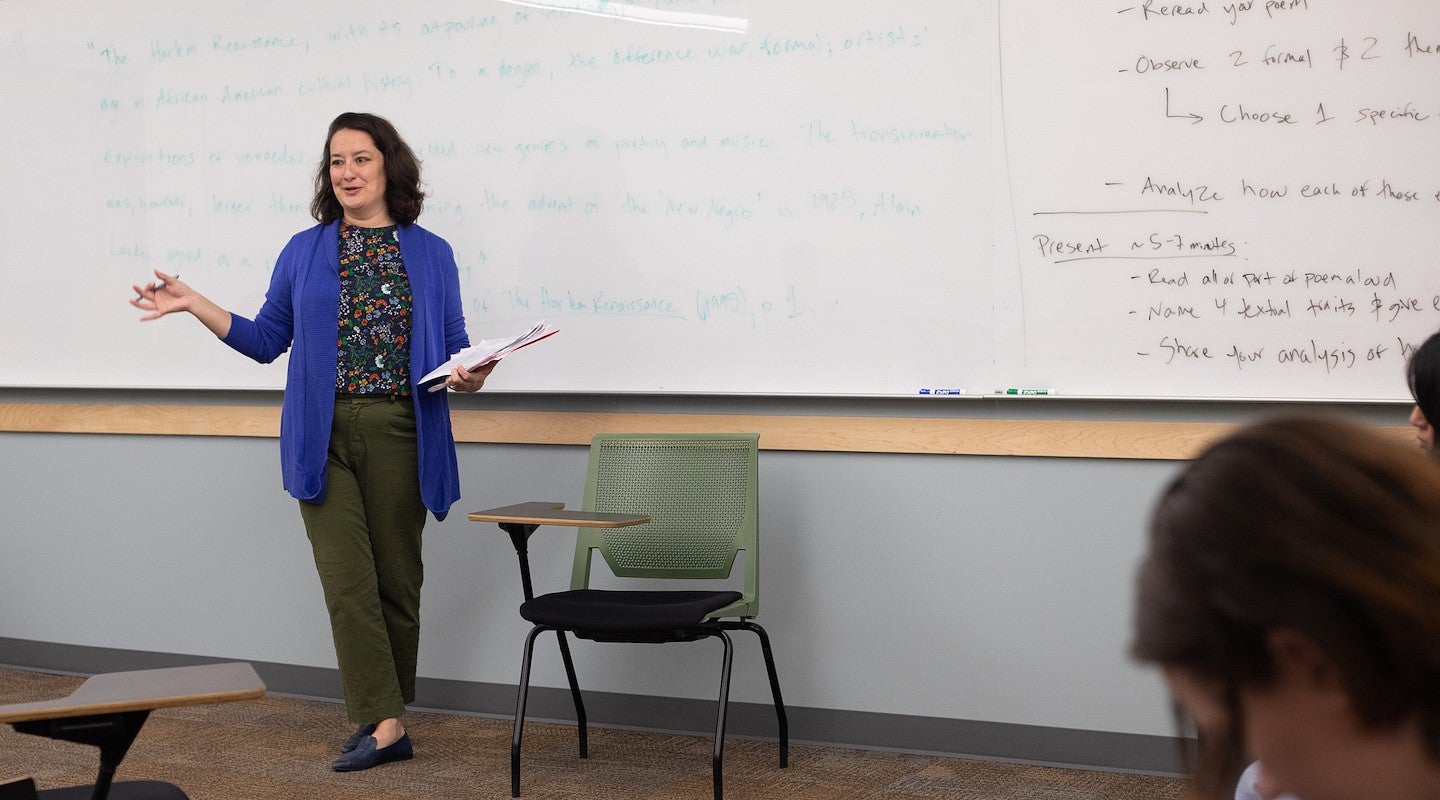
Embracing life and literature
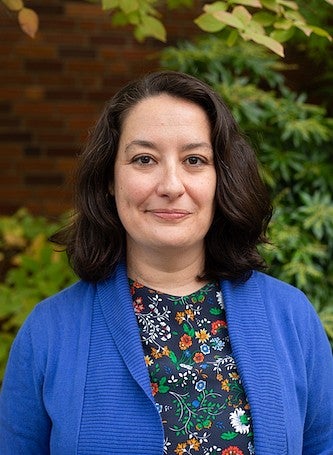
Coffee or tea: Coffee
Feel good song: “Ante Up” by M.O.P. always gets me motivated.
Favorite author: I would never pick only one, but Toni Cade Bambara’s short stories, novels, and essays have been essential to my development as an intellectual and a person.
Describe your perfect day: In the summer, a beach, a book, and a lobster roll on a New England beach with my husband. In the fall, a Murray’s bagel, a visit to The Whitney, and a stroll on the High Line in New York with my best friend.
What is your favorite place: Cape Cod.
Twenty years ago, Courtney Thorsson saw a photo of a group of women. Taken in 1977, this picture would become the cover of Thorsson’s book, “The Sisterhood: How a Network of Black Women Writers Changed American Culture.”
Several years later, Thorsson was anxious and excited as she was about to interview Margo Jefferson in 2018. Over the next couple of years, she went on to interview Renita Weems, Judith Wilson-Pates, and Patricia Spears Jones, all influential Black women who are a part of “the Sisterhood.” The group seen in the photo would change her life.
Thorsson spent a decade crafting this book, traveling from one city to the next for interviews. Her motivation came from her passion for literature.
Throughout her life, she encountered mentors who encouraged her to read all kinds of written work, which is why she wants to further that by celebrating the work of that a group of Black women who worked in writing, publishing, and other academic areas. Their monthly meetings consisted of discussing literature and their daily experiences. The group started a movement of advocacy for each other and other Black women.
“I’m not giving voice to anybody. I’m not speaking for anybody,” Thorsson says. “I’m just putting together the collaborative story of how the work they did transformed American culture. That is a story that hasn’t been told before.”
The book will be released this fall and Thorsson, now a member of the Clark Honors College core faculty, is eager to share it with her colleagues, her students, and anyone who has an interest in reading about the women behind it.
A home in academics
Thorsson grew up an only child and moved around frequently; some states included Massachusetts, North Carolina, New York, and Virginia. Amid this change, one thing remained consistent: the advice she received from her mother. “Somewhere under every single thing I’ve ever written are the lessons that my mom taught me every single day,” Thorsson says. “My mom taught me that all kinds of women’s work matters equally.”
Her mother was a kitchen aid and housekeeper at an elite women’s liberal arts college for 20 years. “It is not lost on me that my mom was making scholarly pursuits possible for elite women,” Thorsson says now with a laugh.
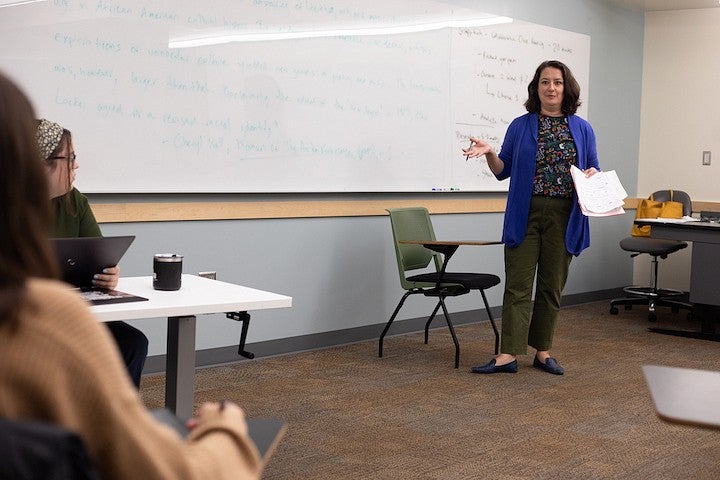
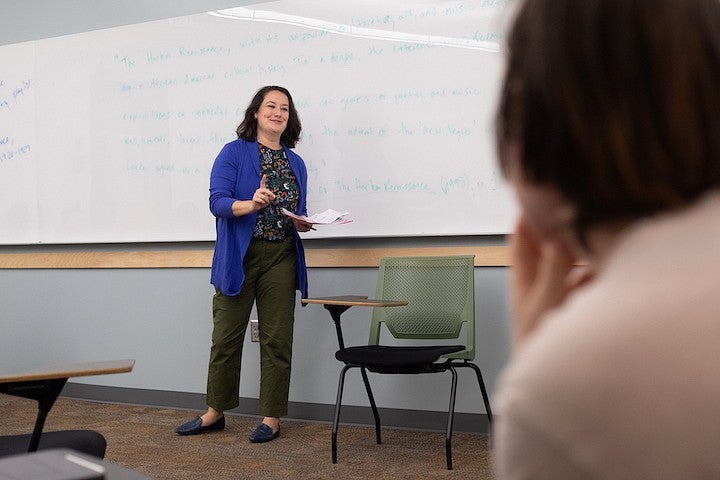
As a student at the University of Virginia, Thorsson relied heavily on her thesis advisor, Eric Lott, for support and inspiration.
She was academically driven. In middle school, she was a student in a pre-college program “where eighth graders could read Dante,” she says.
In one of her middle school classes, Thorsson was assigned to choose any biography that interested her. She chose Malcolm X, not knowing she would later be instructed to dress up as the book’s subject.
With the help of Terrence Young, an influential teacher, she put together her outfit. Young had given her a T-shirt that said: “By any means necessary,” a phrase that Malcolm X made famous in the early 1960s. It was four sizes too big, but it went well with the Malcolm X-inspired glasses the teacher gave her. “Mr. Young even came the day I gave the presentation to sit in the back row,” Thorsson recalls.
As she looked into her future, Thorsson applied to various universities. She landed on the University of Virginia, her in-state university at the time. As an 18-year-old who would be paying her own way, this was her best option.
She worked various jobs to pay her tuition, simultaneously balancing her course load. At times, it was exhausting, but “there wasn’t another choice. I had to eat and pay rent and pay tuition,” she says.
“I’m not giving voice to anybody. I’m not speaking for anybody. I’m just putting together the collaborative story of how the work they did transformed American culture. That is a story that hasn’t been told before.”
Being an English major, Thorsson found herself studying African-American literature often during her undergraduate career. In one of her first classes, Thorsson was outspoken about the course material she felt needed to be taught. She approached her professor and said: “Here are these rap lyrics we should be reading in class.”
At the time, it felt bold to suggest that her professor should be teaching different content. However, this interaction provoked the professor to encourage Thorsson to double-major in English and African-American literature.
Thorsson worked in the library during her time at Virginia, helping to digitize archives so they became widely available to others. She helped digitize the glass plate negatives of the Holsinger collection at the university, along with Steven Railton’s digital project of Uncle Tom’s Cabin.
“My current research depends so heavily on archival research,” Thorsson says, recalling how she benefitted from her campus job. “I think I learned things that set me on that path.”
With her two majors and her campus job at the library, Thorsson was immersed in academia throughout college. She began working on her thesis and her thesis advisor, Eric Lott, gave her the push she needed to realize she could pursue a post-graduate degree.
“I had no idea I was a person who would ever go to graduate school or be a professor,” Thorsson says. “Eric was definitely the first person I encountered who thought I could.”
However, she did not start down that path immediately. With two degrees and experience in archival work, Thorsson got a job in publishing in New York City shortly after graduation. Her career path seemed clear, and she was beginning a new adult life with her high school sweetheart. However, her perspective shifted after September 11, 2001.
An inflection point
Thorsson was living in Manhattan and was at work when the second plane crashed into the South Tower of the World Trade Center. Her husband was on his way to work, switching from the New York City subway to the New Jersey Transit system under the towers, and found himself covered in dust and his pockets filled with rocks.
In the aftermath, she had no way of reaching her loved ones because she didn’t have cell service for a while. She spent hours walking the length of Manhattan to get home from her office, buying an expensive hair dryer on the way to calm her nerves. She eventually reached her husband and connected with friends, but the lingering smell of chemicals in the city reminded her of the tragedy the world had just endured. Her daily life was altered completely.
“There were military armed with machine guns at either end of my block for weeks,” she says. “I had to show my ID and prove I lived there.”
After seeing how life could change in an instant, September 11th became an inflection point and a wake-up call for Thorsson and her community. “We felt like, ‘If you’re not doing what you wanna be doing with your life, what the hell?’”
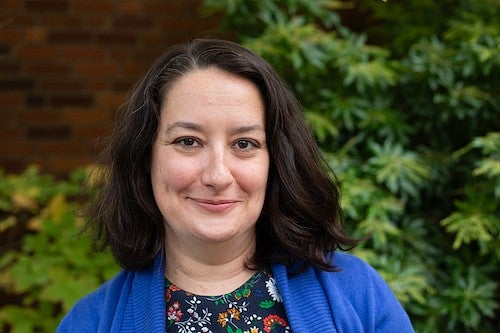
Thorsson applied to PhD programs in New York City after being reminded of the importance of life and opportunities. She applied to graduate programs in the New York area that had strong faculty in African-American literary studies, leading her to Columbia University.
“Now I have a Ph.D. I’m a tenured professor. All are things that I couldn't have even begun to imagine for the vast majority of my life,” Thorsson says. She now resides in Eugene with her husband and has been teaching at the University of Oregon since 2010.
A lifelong learner becomes a teacher
The professors and teachers who had faith in Thorsson along the way inspired her to be where she is today. From middle school to now, she hasn’t forgotten those who rooted for her from the beginning.
Thorsson draws inspiration from her mentors as she began teaching full-time at the Clark Honors College this fall. “I’m really excited,” Thorsson says, “It’s an opportunity to keep getting better as a teacher.”
She spent much of the summer preparing for her courses and the release of her book. Anticipation is growing as it was featured in the Los Angeles Times’ must-read list in August.
With the excitement surrounding her book, Thorsson emphasizes that its purpose is to highlight everyone involved except herself, especially because historically, Black female writers have not always been recognized.
“I want people to look at the book, not at me,” Thorsson says. “I want people to read this book and then read Patricia Spears Jones’ incredible poetry. Or read Margo Jefferson’s two incredible memoirs that she’s written or read Toni Morrison’s novels.”
Thorsson is excited and nervous about her two new endeavors. She reiterates that her work has the same goal: to inspire all people, especially young people, to learn and read work by different Black writers.
“I think it’s important for every student to read, reread, and better understand books by Black people,” she says. “That’s what I’m here to do.”
